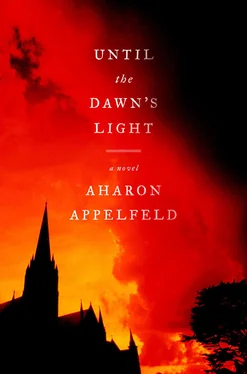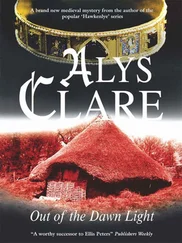Later in the day Blanca remembered the hasty visit she had made to the cemetery during the winter, after Otto’s recovery. No one had been there, and heavy rain whipped the gravestones. The mud on the paths was deep and sticky, and Blanca could barely reach her mother’s grave. When she stood before the small tombstone, she had nothing to say, and she immediately turned back in her tracks. Since that visit, she hadn’t dared return. It seemed to her that her mother was asking her not to come and bother her, as she had done a few weeks before her death.
“My darlings, let me be by myself for a few days,” she had said at the time. “I have to be by myself.” Blanca’s father, who was confused and fearful, had grasped Blanca’s hand, stepped back to the door, and murmured, “We’re going right out. We won’t disturb you. You need rest.” Years had passed since she had heard those trembling words. Now they filled her ears again.
Otto played and played until he finally sank down and slept. From the time he had been a baby, Blanca loved to watch Otto in his sleep. Now he slept in a different position. He lay folded up, and it was evident that his daytime activity was continuing on into his sleep. His intense face softened, and a thin smile spread across it. Blanca sat without moving from her place. The thought that she, with her own hands, had freed Otto from the prison of Kirtzl, had borne him far away and brought him here — that thought filled her with pride.
Suddenly Otto woke up in alarm.
“Mama!” he called out.
“What’s the matter, dear?”
“I dreamed that I lost you in a railway station.”
“That’s not true. I’m here.”
“Why didn’t I see you?”
“That happens sometimes. It was only a dream.”
To distract him, they went down to the dining room and sat in their usual places. It was eight o’clock, and Mrs. Tauber said, “I see that our young man fell asleep and slept well. Now I’ll make him something that he’ll like a lot: cheese dumplings dipped in strawberry jam. I speak poor German, but you understand me, don’t you?”
During that time of the year the guests were few and the dining room was mostly empty, so Mrs. Tauber indulged those who were there. Otto was pleased and ate with gusto. The pension reminded Blanca of another house in another place, but where, she couldn’t remember. She sat and drank cup after cup of coffee. The thoughts that had oppressed her during the day had scattered now, and she watched Otto closely. A feeling that things would be like this from now on, that nothing would separate them, throbbed within her.
“What are you thinking about, Mama?” Otto asked softly.
“Nothing.”
“You’re not thinking about anything?” He tried to understand.
“That happens sometimes.”
Otto chuckled, as though he had caught his mother once again in a kind of mental lapse.
THE NEXT DAY Blanca learned from Mrs. Tauber that a Jewish woman had recently opened a kindergarten on the outskirts of the city. She had studied in Vienna and was applying modern educational methods. I must find a secure shelter for Otto, she said to herself, and so they went there.
It was an old-fashioned house. The windows were broad, there was a garden behind the house, and beyond the fence were open fields. Blanca introduced herself.
“My name is Blanca Guttmann,” she said, “and this is my son, Otto Guttmann. We heard about your kindergarten, and we’d like to learn more.”
“My name is Rosa Baum,” the woman answered. “This is actually the community orphanage.”
“That’s exactly what I’m looking for,” Blanca said. “I can help out here, if there’s a need.”
“Regrettably, we can’t offer a salary.”
“I don’t need a salary.”
So Blanca and Otto were received in “The Home,” which is what Rosa called it.
“The place is just right for Otto,” Blanca told Mrs. Tauber that evening. “The house is close to the fields, and light streams in from the windows. I’m so grateful to you.”
“I didn’t do anything,” Mrs. Tauber said, blushing.
“You helped us,” Blanca insisted. “Without your help, we were like blind people.”
Mr. Tauber, in contrast to his wife, spoke in torrents, interpreting and explaining, and his efforts to please the guests were somewhat ridiculous. Despite this, he also had a certain charm, especially when he appeared in the morning with the coffeepot in his hand, loudly announcing his wish to be of service.
“Fresh coffee,” he would say. “I prepared it with my own hands just now.”
Rosa Baum was about thirty-five years old, but her face was like a young girl’s. When she knelt, she was no taller than the children who surrounded her. She herself had been orphaned at a young age, and good people had adopted her and taken care of her schooling. When she was eighteen, they had sent her to Vienna to study education at a well-known institution named after Rousseau. She studied there for five years. At the end of her studies she was invited to stay on and teach, but Rosa wanted to come back to Struzhincz and establish the first orphanage in the province. At the beginning it wasn’t easy. For many months she knocked on the doors of wealthy people until she found a donor, Dr. Haussmann, and he placed a beautiful home at her disposal. The daily needs and the salaries were paid for by the Jewish community.
In the mornings Blanca helped to wash the children and to prepare the prayer hall. The prayers lasted no longer than twenty minutes, and afterward breakfast was served.
“I never learned the Hebrew alphabet,” Blanca apologized.
“It’s not hard to learn, if you want to,” said Rosa in the manner of a person who has known sorrow in her life.
“And my knowledge of Judaism, I’m ashamed to say, is extremely limited,” said Blanca. She remembered the thick holiday prayer book she had seen in her mother’s hands, and its yellowed pages.
Otto felt comfortable in the orphanage. He played with the children on the floor. They spoke a mixture of Yiddish and German, and he usually understood what they were talking about. Sometimes, when he didn’t understand a word, he raised his head, looked over to his mother, and Rosa explained it to him.
At ten thirty Rosa would tell them a Bible story. When Rosa was speaking, the children were very attentive, devouring every word. Afterward they would return to their play in the central room or on the balcony. When a quarrel broke out — and a quarrel did break out once or twice a day — Rosa would stand in the middle of the room, close her eyes, and say, “God in heaven sees everything and hears everything. He is our father and our redeemer, and He commands us to love one another.” Amazingly, the quarrel would die down.
At first Blanca was put off by Rosa’s religiosity — it seemed contrived to her — but now she saw that her worship of God was neither artificial nor bitter. There was simplicity in her ways and in her faith, and that faith is what she sought to instill in the children.
During one break Rosa said to Blanca, “I’m trying to bring the children close to the faith of their fathers. A person who is connected with the faith of his fathers is not an orphan.”
“Will they be religious children?” Blanca asked, immediately sensing that there was a flaw in her question.
“We teach them how to pray,” Rosa replied.
“In my house we didn’t observe the tradition,” said Blanca, realizing that it wasn’t the full truth.
In the afternoon Blanca would go down to the market and buy groceries for The Home. The market extended out over a broad, bustling plaza. Peasants displayed their produce in improvised stalls or on long linen cloths. The bustle filled Blanca with a marvelous feeling of forgetfulness, and for a moment it seemed to her that she hadn’t just arrived in Struzhincz, but that she had been working in The Home and shopping in this market for years. Toward evening she would return from the market, laden, and lay the baskets on the mats next to the sink. She would prepare supper together with Rosa.
Читать дальше








![Traudl Junge - Hitler's Last Secretary - A Firsthand Account of Life with Hitler [aka Until the Final Hour]](/books/416681/traudl-junge-hitler-s-last-secretary-a-firsthand-thumb.webp)



